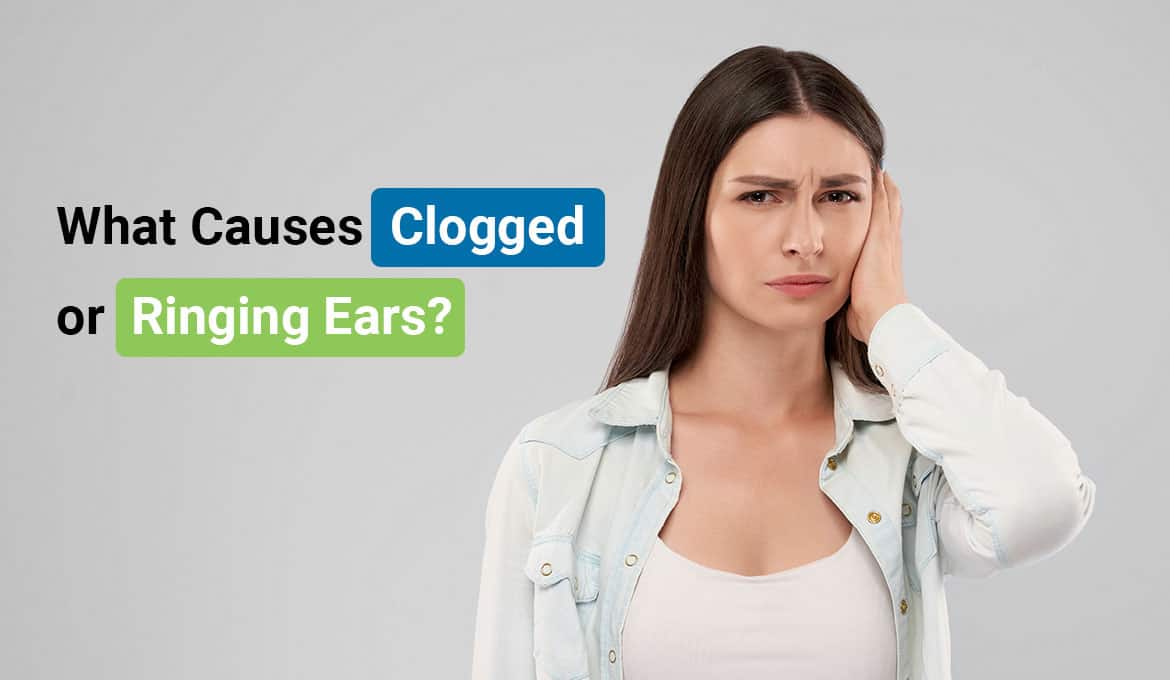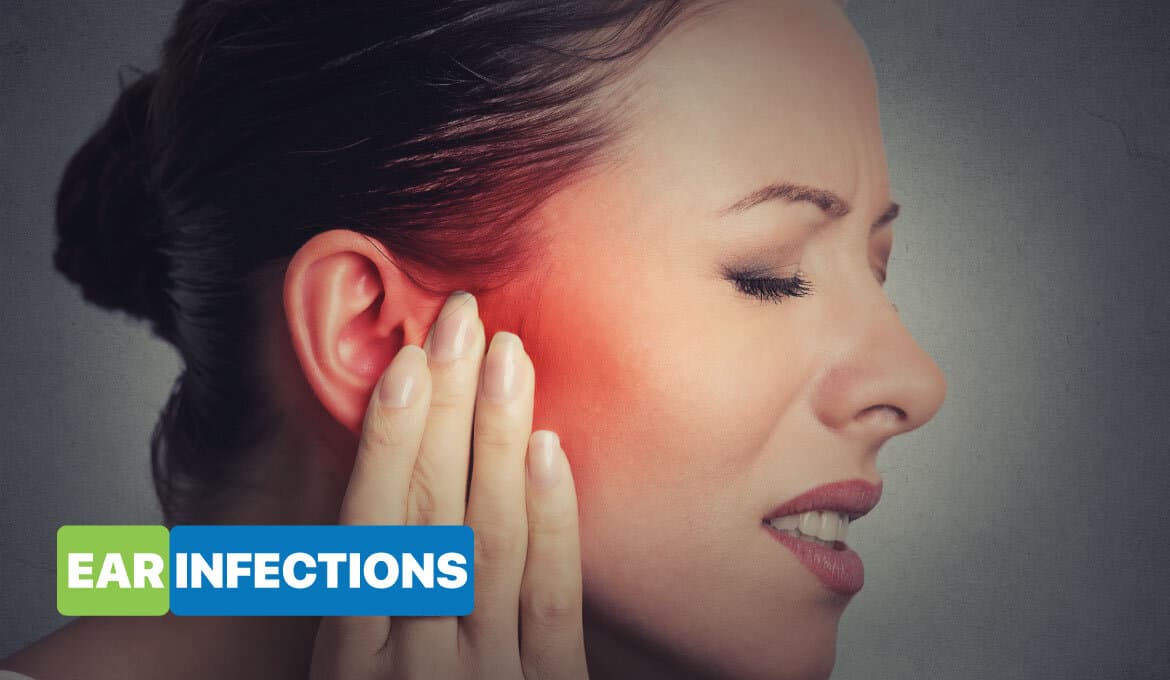
A buzzing sensation or an odd constant feeling, even while on the ground, can be unnerving. These signs can be worrisome if they appear out of the blue. They can disrupt concentration, cause mood swings, and affect your balance.
There are multiple reasons behind blocked ears. It can result from clogged earwax, ear conditions, disturbance in sinus pressure, and infections.
If you've been spending hours researching ‘What causes clogged or ringing ears”, today is your lucky day.
Learn all about ringing and blocked ears, along with the right methods to prevent it from happening again.
What are the reasons behind ears feeling clogged and ringing?
The bad news is that ear clogging, and ringing can occur for many reasons.
The good news is that it can be temporary.
Here're a few causes that might be causing ear discomfort:
Reason 1: Impacted Cerumen
Or, your default ear problem creator – earwax buildup.
As important as earwax is for cleansing the ear canal, excess production can lead to irritation, pressure creation, and even hearing loss. If your ears feel clogged and the ringing sensation persists, blocked earwax might be a cause. It can happen to anyone of any age group.
Generally, it happens to individuals who:
- Frequently use hearing dis, earbuds, and plugs
- Have excess ear hair
- Are suffering from conditions such as eczema
- Are regular users of cotton swabs and other objects in their ears
- Belong to the age group above 55
- Are experiencing developmental disabilities
- Have narrow ear canals
The most common symptoms of earwax buildup are feeling pressure or fullness, earache, ringing in ears, discharge, dizziness, and worsened hearing ability.
Don't worry. It's not as gruesome as the combined symptoms make it out. You can get it treated with both in-clinic and at-home methods.
Based on your diagnosis, your doctor will provide a solution to dissolve the hardened earwax. They may also recommend ear irrigation practices to extract the accumulated wax in a medical facility.
Reason 2: Sinus Pressure
Any abrupt change in the sinus pressure can result in the ears being plugged and a ringing sensation. It can happen due to the fluctuation faced by the pressure between the middle ear and the throat's back.
The sudden flux in air pressure leads to an inward pull or outward push of the eardrum, causing discomfort.
The sinus pressure can occur due to sinusitis, swelling of paranasal sinuses, allergies, smoking, swimming, diabetes, dental infections, and during a plane ride. With the altitude changes, the pressure equalization by the eustachian tube is impacted, leading to clogged ears.
The symptoms may not always be noticeable in the cases of ears feeling clogged and ringing sensation due to sinus pressure. The prominent signs occur when there's an infection or an ear condition leading to the clogging of ears. They include:
- Muffled hearing
- Decrease in the sense of smell
- Facial pressure
- Runny nose
- Tenderness in the face
- Postnasal drip
- Toothache in the upper jaw
- Fever
- Fatigue
Generally, clogged ears due to sinus pressure don't require a regimented treatment of antibiotics. It usually heals on its own. However, if there are underlying conditions causing the disease, medical consultation is essential.
Reason 3: Ear infections
Experts term ear infections as otitis. It impacts the middle portion of the ear and can occur at any age.
Generally, there are two kinds of ear infections. In otitis externa, the water gets blocked inside the ear leading to the growth of fungus or bacteria. Similarly, in otitis media, microorganisms travel to the space behind the eardrum.
The most common symptoms of ear infections other than clogged ears and ringing sensation are:
- Ear pain
- Headache
- Restless sleep
- Appetite loss
- Feeling nauseous
- Diarrhea
- Fever
- Irritability
- Inability to find the right balance
There are a number of causes that can result in ear infections. These comprise:
- Genetics
- Deficiency of Vitamin A
- Exposure to smoke
- Hearing aids and implants
- Biological abnormalities
Generally, these infections clear out on their own. But, if the pain is unbearable, the doctors might recommend a few painkillers and antibiotics to improve the condition. Additionally, pediatricians also prescribe medications to infants below the age of 24 months for faster relief.
Reason 4: Eustachian Tube Dysfunction
Eustachian Tube Dysfunction (ETD) happens when the drainage from the middle of the ear to the back of the throat is affected.
The Eustachian tube is the connecting channel between the throat and middle ear. It facilitates the movement of fluid and mucus from the ear to the throat to be swallowed.
Due to the dysfunction of ET, fluid, and mucus get trapped in the middle ear causing the blockage. The plugged ear usually leads to an infection such as influenza, sinusitis, etc.
The main symptoms you must keep a watch on to detect ET dysfunction are as follows:
- Sore throat
- Coughing
- Sneezing
- Runny nose
Typically, the ETD resolves on its own. However, in complicated cases, doctors recommend antihistamines, antibiotics, pain relievers, and surgery, depending on the severity of the condition.
Reason 5: Cholesteatoma
If you feel that your ears won't stop ringing and feel clogged, you might have cholesteatoma. It is a noncancerous growth that forms behind the eardrums. It can grow large enough to impact the hearing ability of a person. It can even lead to permanent hearing loss if not treated timely.
The condition can affect both children and adults. Additionally, it can also impact individuals who are suffering from the following:
- Chronic ear infections
- Tear in the eardrum
Strangely, early cholesteatoma doesn't cause any noticeable symptoms. However, the primary marker of the condition is an ear discharge. It can be dark in color with a foul smell. It can also be sticky with a pus-like texture.
It's important that you pay special attention to the discharge, especially in children, as its growth can cause severe symptoms, such as:
- Change in the sense of smell and taste
- Fatigue
- Pain
- Dizziness
Based on the severity of the symptoms, the healthcare providers prescribe treatment. It can be in the form of eardrops to drain the accumulated fluid and antibiotics to relieve the infection. It can also include surgery if the blockage has grown into a large mass.
Treatment and Prevention of Clogged Ear
The treatment of ears plugged and ringing sensation depends on the type of condition causing the blockage. Generally, home remedies help in offering relief to patients.
1. For dislodging trapped fluid
To remove the accumulated fluid inside the ear, you can insert your index finger into the ear and slowly move it. Keep in mind that the motion should be in an up-and-down sequence.
Additionally, you can also take the help of a hair dryer. Keep the dryer at a low heat setting and hold it at a distance of a few inches to dry the fluid inside your ears.
2. For opening the eustachian tube
With the Valsalva maneuver, you can clear the trapped fluid in your Eustachian tube.
To perform this, take a deep and long breath and pinch the upper part of your nose. While keeping the mouth closed, try exhaling the air gently. This will generate pressure inside the canal and release the fluid. You'll notice a popping feeling inside your ear while performing the maneuver.
3. For loosening mucus
If your infections have resulted in ear blockage, steam usage is the best method to unclog them.
You can take a hot shower for a long duration. The steam from the water while loosening the accumulated mucus inside your ear. Additionally, you can use a vaporizer. All you need to do is place a towel above your head while taking the steam to ensure the flow of steam inside your ear as well.
4. For allergy-induced ear blockage
If you’ve followed all the methods along with the research on how to unclog ears, medication is the next best alternative. You can take over-the-counter medicines to relieve sinus congestion.
On top of this, you can also take help from a medical practitioner to understand the right course of treatment.
5. For flushing out earwax
Eardrops are one of the most suitable methods to remove earwax buildup. You can use them twice or thrice a day or as recommended by your doctor.
In the absence of ear drops, you can also consider using mineral oil, hydrogen peroxide, or baby oil to loosen the buildup.
Keep in mind to tilt your head while using these drops. The accumulation will clear with the liquid. Don't try to dig it out, as it can lead to severe complications.
Additionally, it's best to consult a doctor for earwax removal if you're facing ear drainage.
Typically, there's no fixed method to prevent the occurrence of clogged ears. However, you can take certain precautions to control the excess buildup of earwax and limit the symptoms' impact. Some of the effective ways include:
- Clean your ears regularly
- Schedule routine checkups with ENT specialists
- Evaluate your condition with a doctor if symptoms occur
- Avoid high altitudes if you have Eustachian tube dysfunction
- Wear earplugs to prevent the air pressure imbalance before you fly
When is the right time to consult a medical expert for clogged ears?
The pressure buildup with the feeling of fullness can be disturbing. Generally, it is manageable, but in some cases, it can lead to hearing loss.
The right time to take medical assistance is:
- If you've attempted wax removal at home but can't see any results, you must consult a doctor
- If your symptoms align with Eustachian tube dysfunction, it's best to take help for medication prescriptions like antibiotics and antihistamines
- Your condition is accompanied by intolerable pain leading to disruption in daily life
Conclusion
If your ears won't stop ringing and feel clogged, it's obvious to get concerned. However, most of the conditions leading to clogging of the ear are temporary.
You can ease your symptoms with OTC medicines recommended by your doctor. In addition, home remedies also bring relief to the ringing sensation and plugged ears.
Only in extreme ear conditions like cholesteatomas, surgical intervention is required. It helps with the removal of growth and inner ear repair.
That being said, ear examination must be a part of your health assessment to ensure the prevention of irreparable damage and complications.
FAQs
1. What are the complications of huge cholesteatomas causing clogged ears?
Large cholesteatomas can lead to damage in the middle ear. It can also cause inner ear damage. In rare cases, it can lead to:
- Swelling and pus in the brain
- Meningitis
2. What is the result of untreated Eustachian tube dysfunction?
Untreated ETD can cause permanent hearing loss and damage to the middle ear and eardrum. Generally, the eustachian tube clogging clears out on its own within weeks. But, in some patients, it can last beyond months leading to severe ear infections.
3. How are ear infections identified?
An ear infection examination is done by an ENT specialist using an otoscope. The doctor observes the color of the eardrum in a physical examination. If the color of the ear part is pinkish gray, it points to the presence of infection.
Additionally, doctors also conduct tympanometry to check the air pressure inside the ear. Specialists also perform hearing tests if there's a suspicion of hearing loss.
4. What happens if you have excess earwax in your ears?
An increase in earwax buildup can cause a range of symptoms. It can result in pain, ringing in the affected ear, itching, dizziness, and a feeling of fullness. In some patients, it's also the reason behind hearing loss due to the spread of infection inside the ear canal.
5. What is Meniere's disease?
It is a disorder that impacts the inner part of the ear. Individuals with the condition experience a heavy buildup of earwax. The excess accumulation results in dizziness, ear ringing, and even hearing loss after a long presence.
6. Is it possible to feel clogged in one ear?
Yes. Ear infection, waxy accumulation, and ear diseases can cause clogging of only one ear. In some cases, it is also a result of acoustic neuroma, which is a noncancerous growth in the ear.
Read Also:







